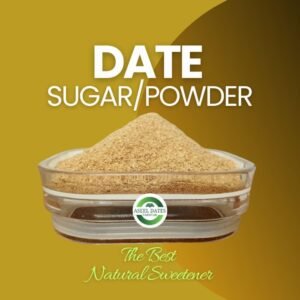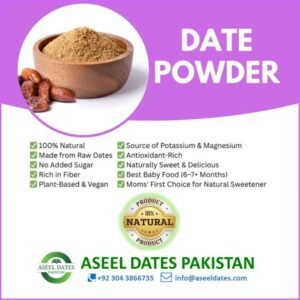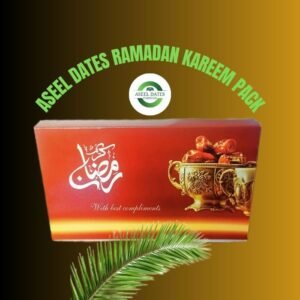
When it comes to choosing the right sweetener for your health and lifestyle, the options can be overwhelming—from natural extracts to artificial compounds and sugar alcohols. While many popular sugar substitutes like Stevia, Erythritol, Canderel, and Sucralose offer low or zero calories, they often come with trade-offs such as bitter aftertastes, digestive discomfort, or a lack of nutritional value. In contrast, Date Sugar (also known as Date Powder) is a 100% natural, minimally processed sweetener derived from dried dates. It not only delivers gentle sweetness and a mild, caramel-like flavor but also retains vital fiber, antioxidants, vitamins, and minerals. Below is a breakdown comparing Date Sugar with commonly used sugar substitutes to help you make an informed choice.
✅ Stevia vs. Date Sugar
- Stevia is plant-derived but often highly processed, with a bitter aftertaste.
- Date Sugar is a natural, whole food sweetener with a pleasant flavor and added nutrients.
✅ Erythritol vs. Date Sugar
- Erythritol is a sugar alcohol that may cause gas and bloating in some users.
- Date Sugar is easy to digest and rich in fiber and antioxidants.
✅ Mivolis vs. Date Sugar
- Mivolis sweeteners may contain synthetic additives and artificial compounds.
- Date Sugar is 100% pure, made from dried dates without any chemicals or preservatives.
✅ Allulose vs. Date Sugar
- Allulose is a rare sugar with low calories but is industrially manufactured.
- Date Sugar is a natural, nutrient-dense sweetener with widespread culinary uses.
✅ Kithul vs. Date Sugar
- Kithul treacle is liquid, less suited for dry recipes or baking.
- Date Sugar is a versatile dry sweetener, ideal for baked goods, cereals, and smoothies.
✅ Monk Fruit vs. Date Sugar
- Monk Fruit is natural but often blended with erythritol or dextrose.
- Date Sugar is a single-ingredient, whole food with natural sweetness and nutrients.
✅ Canderel vs. Date Sugar
- Canderel contains aspartame, a highly processed artificial sweetener.
- Date Sugar offers natural sweetness with no chemical additives or synthetic taste.
✅ Sucralose vs. Date Sugar
- Sucralose is a chlorinated sugar compound found in many diet products.
- Date Sugar is chemical-free, supporting a clean-label, natural diet.
✅ Xylitol vs. Date Sugar
- Xylitol may cause digestive upset in some individuals, especially in high amounts.
- Date Sugar is a gentle and gut-friendly option with natural fiber content.
✅ Splenda vs. Date Sugar
- Splenda, a brand of sucralose, is zero-calorie but artificial.
- Date Sugar delivers natural energy, essential nutrients, and real-food goodness.
✅ Aspartame vs. Date Sugar
- Aspartame is an artificial compound with a long history of controversy.
- Date Sugar is a safe, plant-based sweetener packed with minerals and antioxidants.
✅ E951 (Aspartame) vs. Date Sugar
- E951 (Aspartame) is an artificial sweetener, 200x sweeter than sugar, used in diet foods but linked to health concerns and contains no nutrients.
- Date Sugar is a 100% natural sweetener made from dried dates in powder form, rich in fiber, antioxidants, and vitamins—ideal for clean, healthy eating.
📌 Conclusion: The Natural Sweet Choice
Whether you’re baking a cake, sweetening your coffee, or preparing baby food, Date Sugar offers a clean, nutritious, and delicious alternative to processed and synthetic sweeteners. It supports gut health, promotes clean eating, and delivers real energy and nutrition—making it a smart choice for health-conscious individuals and families alike.




